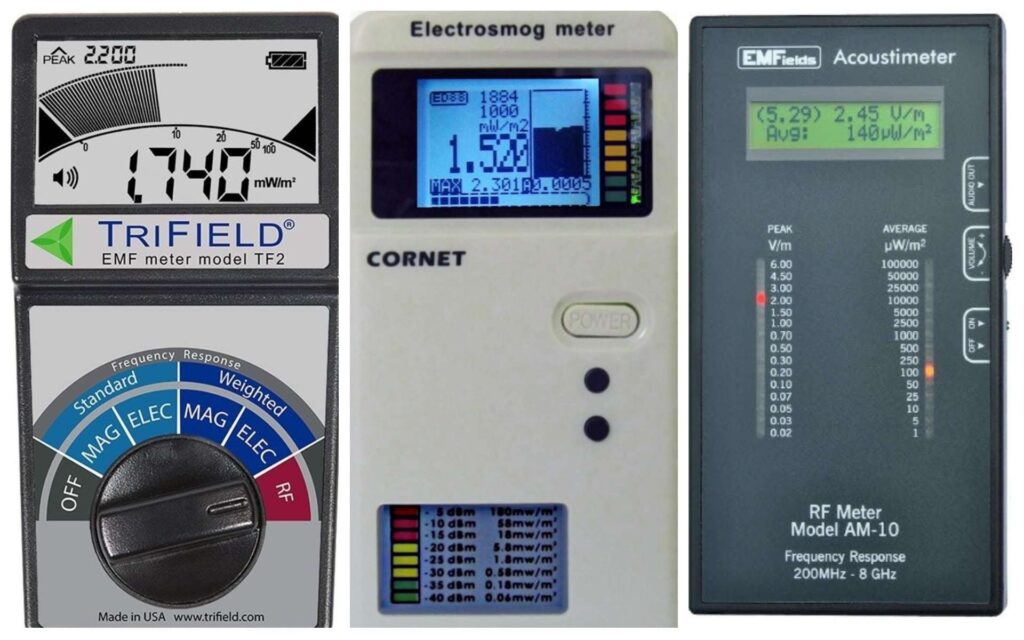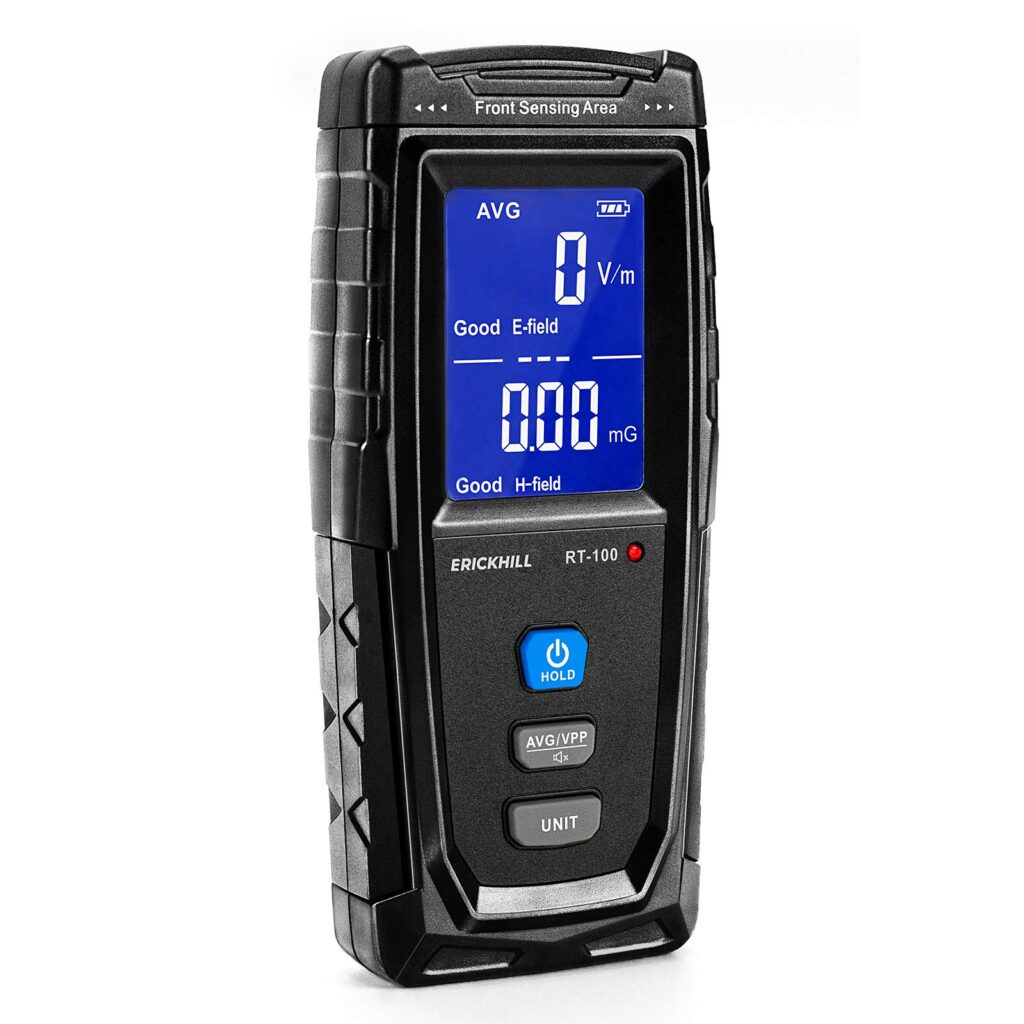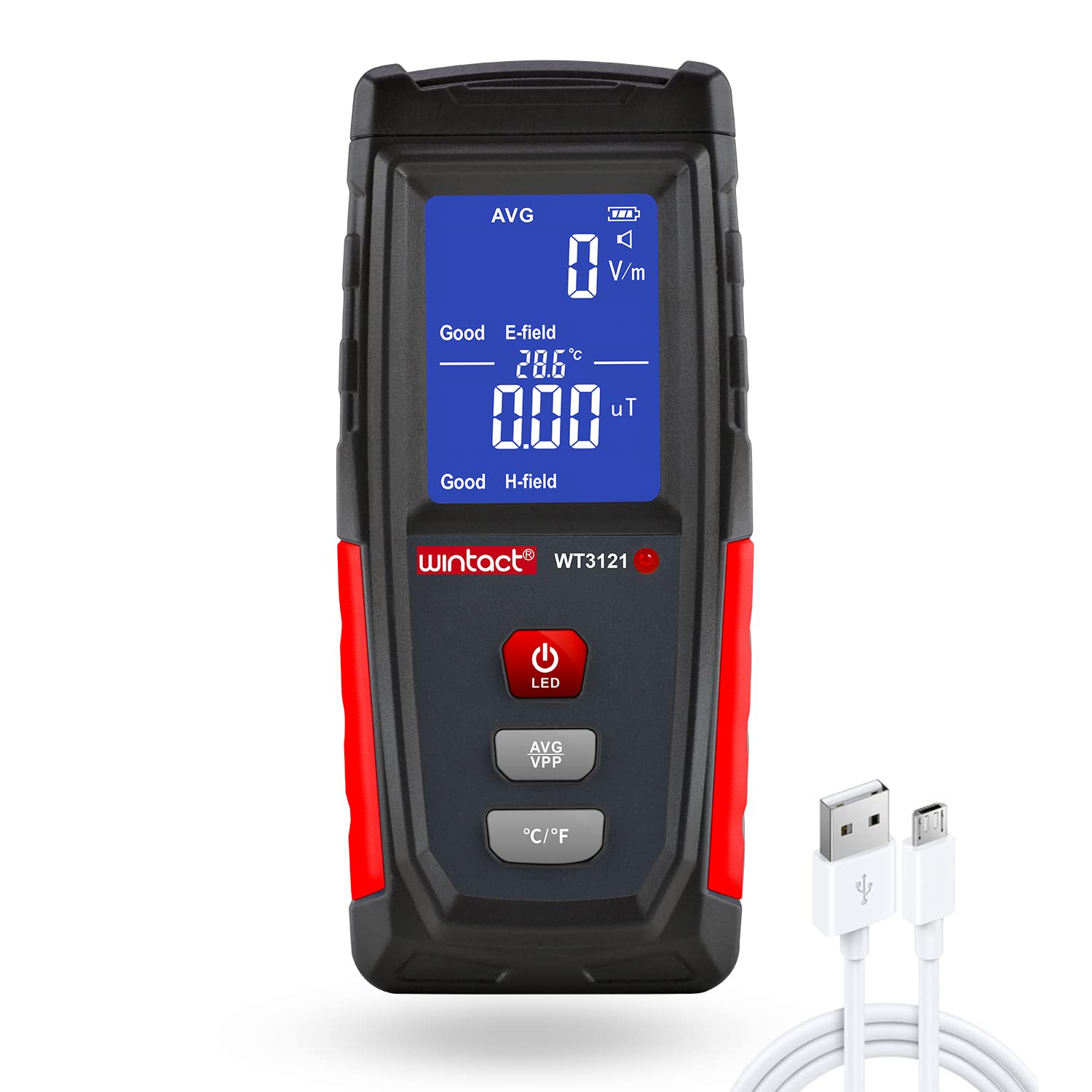Are you concerned about the potential electromagnetic field (EMF) exposure in your home? If so, you’re in the right place! In this article, we will introduce you to the best EMF detectors for home use. With increasing reliance on technology and the growing number of electronic devices around us, it’s essential to monitor and understand the EMF levels in our living spaces. Whether you want to ensure a safe environment for your family or simply satisfy your curiosity, these EMF detectors will help you stay informed and make informed decisions about the potential risks. So let’s explore the top EMF detectors available for home use and empower you to take control of your electronic surroundings!
Click here to check out the Ghost Hunting Spirit Box – MEL-8704R & K2 EMF Meter & EVP Recorder
Introduction
Welcome to this comprehensive guide on EMF detectors for home use! In today’s modern world, we are surrounded by electromagnetic fields (EMF) emitted by various electronic devices. While these fields are invisible to the naked eye, they can have a potential impact on our health. It is crucial to understand and detect these EMFs to ensure a safe and healthy living environment for you and your loved ones. In this article, we will explore the different types of EMFs, the sources of EMFs in the home, the importance of EMF detection, factors to consider when choosing an EMF detector, the best EMF detectors available, reviews and comparisons of popular models, tips for using EMF detectors effectively, and finally, a concluding note. So, let’s dive in!
Understanding EMF
What is EMF?
EMF stands for electromagnetic field. It is a field of energy that is created by the movement of electrically charged particles. Everything that uses or produces electricity creates an EMF. From power lines and Wi-Fi routers to cell phones and appliances, EMFs are everywhere in our daily lives. While some EMFs are natural and harmless, others can be potentially harmful to our health if we are exposed to them for prolonged periods.
Types of EMF
There are two main types of EMFs: ionizing and non-ionizing. Ionizing EMFs have high levels of energy and can cause severe health issues like cancer and DNA damage. X-rays and gamma rays are examples of ionizing EMFs. On the other hand, non-ionizing EMFs have lower levels of energy and are less harmful. However, studies suggest that long-term exposure to certain non-ionizing EMFs, such as those from power lines and wireless communication devices, may still have adverse health effects.
Sources of EMF in the Home
In our homes, there are several sources of EMF. Common sources include electrical wiring, appliances, Wi-Fi routers, cell phones, televisions, and even smart meters. It is important to note that the level of EMF exposure varies depending on the distance from the source and the strength of the EMF. By identifying these sources and measuring their intensity, you can take appropriate measures to protect yourself and your family.

This image is property of emfacademy.com.
Click here to check out the Ghost Hunting Spirit Box – MEL-8704R & K2 EMF Meter & EVP Recorder
Importance of EMF Detection
Health Risks of EMF Exposure
Research has indicated that prolonged exposure to certain levels of EMFs may lead to various health risks. These risks include an increased risk of cancer, fertility problems, neurological disorders, sleep disturbances, and even developmental issues in children. While the scientific community is still exploring the exact mechanisms and thresholds, it is advisable to take precautionary measures to minimize EMF exposure in our homes.
Protection and Mitigation Measures
By using an EMF detector, you can identify the areas in your home where EMF levels are higher and take steps to reduce your exposure. This may involve rearranging furniture, switching off appliances when not in use, and creating EMF-free zones where you spend the most time, such as your bedroom or workspace. EMF detectors play a vital role in implementing these protection and mitigation measures to safeguard your health.
Factors to Consider
When choosing an EMF detector for home use, there are several factors you should consider. Let’s explore these factors to help you make an informed decision.
EMF Detector Types
There are various types of EMF detectors available in the market, ranging from simple handheld meters to more advanced digital analyzers. Handheld meters are portable and easy to use but may provide limited features, while digital analyzers offer more comprehensive data and analysis capabilities but may be more complex to operate. Understanding your requirements and the level of detail you need will help you determine the most suitable type for your needs.
Accuracy and Sensitivity
The accuracy and sensitivity of an EMF detector are crucial for reliable readings. Look for detectors that have been tested and verified for accuracy by reputable organizations. Additionally, consider the sensitivity of the detector, as this will determine its ability to detect lower levels of EMF. A highly sensitive detector will ensure that you can measure even the smallest fluctuations in EMF intensity.
Frequency Range
EMFs can vary in frequency, and different detectors are designed to measure specific frequency ranges. Make sure the detector you choose covers the frequency range you are most concerned about. For example, if you are primarily concerned about high-frequency EMFs emitted by cell phones and Wi-Fi routers, opt for a detector that can accurately measure these frequencies.
Ease of Use
For most homeowners, ease of use is an important factor when selecting an EMF detector. Look for detectors with user-friendly interfaces and clear instructions. Ideally, the detector should provide simple and straightforward readings that are easy to interpret. Consider whether you prefer a detector with a digital display, audible alerts, or both, depending on your personal preferences and ease of understanding.
Additional Features
Some EMF detectors offer additional features that can enhance your detection experience. These may include data logging capabilities, real-time monitoring, adjustable sensitivity settings, or even connectivity options to transfer data to a computer or smartphone. Consider whether these additional features are important to you and if they align with your specific requirements.
Budget
Lastly, consider your budget when selecting an EMF detector. Detectors can range in price, depending on their features and capabilities. Determine how much you are willing to invest in an EMF detector and prioritize the factors that are most important to you. It is worth noting that investing in a reliable and accurate detector may have long-term health benefits, making it a worthwhile investment.

This image is property of Amazon.com.
Click here to check out the Ghost Hunting Spirit Box – MEL-8704R & K2 EMF Meter & EVP Recorder
Best EMF Detectors for Home Use
Now that we understand the importance of EMF detection and the factors to consider, here are our top picks for the best EMF detectors for home use:
1. EMF Meter Model A
The EMF Meter Model A is a highly accurate and easy-to-use handheld meter that provides reliable readings of EMF levels in your home. It offers a wide frequency range and features a digital display for clear and precise measurements. With its affordable price point, this EMF meter is an excellent choice for those new to EMF detection.
2. EMF Detector Model B
The EMF Detector Model B is a more advanced option that offers additional features such as real-time monitoring and data logging. This detector provides comprehensive data analysis and allows you to track EMF levels over time. With its adjustable sensitivity settings, you can customize the detector to suit your specific needs.
3. Portable EMF Scanner
The Portable EMF Scanner is a compact and lightweight option that is perfect for on-the-go EMF detection. It offers quick and accurate measurements, making it ideal for checking EMF levels in different areas of your home or even while traveling. Despite its small size, this scanner provides reliable readings and is easy to operate.
4. Digital EMF Analyzer
The Digital EMF Analyzer is a high-tech option for those who want detailed information about EMF levels in their home. It offers advanced data analysis capabilities, allowing you to identify specific sources of EMF and their intensity. With its user-friendly interface and comprehensive display, this analyzer is a great choice for those seeking in-depth EMF information.
5. Wireless EMF Detector
The Wireless EMF Detector is designed specifically for detecting and measuring EMF levels emitted by wireless communication devices such as Wi-Fi routers and cell phones. It provides accurate readings within a specific frequency range and offers user-friendly features like audible alerts and adjustable sensitivity. This detector is perfect for those concerned about wireless EMF exposure.
6. High-Range EMF Monitor
If you are looking for a detector that can measure high-frequency EMF levels accurately, the High-Range EMF Monitor is an excellent option. It covers a wide frequency range and offers high sensitivity to detect even the smallest fluctuations. With its advanced features and reliable performance, this monitor ensures comprehensive EMF detection.
7. EMF Detector Watch
For a wearable option, the EMF Detector Watch combines style and functionality. It not only tells the time but also provides real-time EMF readings on your wrist. With its sleek design and easy-to-read display, this watch ensures constant awareness of your EMF exposure wherever you go.
8. Smart Home EMF Sensor
The Smart Home EMF Sensor is a technologically advanced detector that seamlessly integrates with your smart home system. With its connectivity options, you can monitor EMF levels through your smartphone or computer. It provides real-time data, alerts, and even suggests mitigation measures to create a safe living environment.
9. EMF Detector App
For those who prefer a digital solution, EMF detector apps are available for smartphones. These apps utilize the phone’s built-in sensors to detect EMF levels in your surroundings. While not as accurate as dedicated EMF detectors, they can still provide a general idea of EMF intensity. Ensure that you choose a reputable app with positive user reviews for better accuracy.
10. EMF Detector Pen
The EMF Detector Pen is a convenient and portable option for quick EMF detection. It resembles a regular pen and can be easily carried in your pocket or bag. With its simple on/off operation, you can quickly assess the EMF levels in different areas of your home or office.
Reviews and Comparisons
Now, let’s dive into the detailed reviews and comparisons of the EMF detectors mentioned earlier. We will explore their features, performance, pros, and cons to help you make an informed decision based on your specific requirements.
1. EMF Meter Model A
Features:
- Handheld meter
- Wide frequency range
- Digital display
Performance:
The EMF Meter Model A provides accurate and reliable readings of EMF levels. Its wide frequency range allows you to measure various types of EMFs, and the digital display ensures easy interpretation of the results. Users have reported consistent performance and high levels of satisfaction with this EMF meter.
Pros:
- Affordable price
- Easy to use
- Portable and lightweight
Cons:
- Limited additional features
- Basic interface
2. EMF Detector Model B
Features:
- Real-time monitoring
- Data logging capabilities
- Adjustable sensitivity settings
Performance:
The EMF Detector Model B offers advanced features, making it a versatile choice for detailed EMF analysis. Its real-time monitoring provides constant updates on EMF levels, and the data logging capabilities allow you to track trends over time. The adjustable sensitivity settings enable customization based on your specific needs.
Pros:
- Comprehensive data analysis
- User-friendly interface
- Customizable sensitivity
Cons:
- Higher price point
- May be overwhelming for beginners
3. Portable EMF Scanner
Features:
- Compact and lightweight design
- Quick and accurate measurements
Performance:
The Portable EMF Scanner is a convenient option for those on the move. Its compact size allows you to carry it anywhere, and it provides accurate measurements within seconds. Users appreciate its ease of use and the ability to check EMF levels in different areas of their homes or while traveling.
Pros:
- Portable and lightweight
- Quick measurements
- Easy operation
Cons:
- Limited frequency range
- Less detailed readings compared to advanced models
4. Digital EMF Analyzer
Features:
- Advanced data analysis capabilities
- User-friendly interface
- Comprehensive display
Performance:
The Digital EMF Analyzer is a high-tech option for those seeking detailed information about EMF levels. Its advanced data analysis capabilities allow you to identify specific sources of EMF and their intensity. The user-friendly interface and comprehensive display make it easy to navigate and interpret the results.
Pros:
- Detailed data analysis
- Clear and comprehensive display
- Intuitive interface
Cons:
- Higher price point
- More complex to operate
5. Wireless EMF Detector
Features:
- Designed for wireless EMF detection
- Audible alerts
- Adjustable sensitivity
Performance:
The Wireless EMF Detector is specifically designed to measure EMFs emitted by wireless communication devices. It provides accurate readings within a specific frequency range, allowing you to assess your wireless EMF exposure. The audible alerts and adjustable sensitivity settings make it easy to identify areas with higher EMF levels.
Pros:
- Tailored for wireless EMF detection
- Audible alerts for easy identification
- Adjustable sensitivity
Cons:
- Limited coverage of other EMF frequencies
- May not provide detailed readings for non-wireless EMFs
6. High-Range EMF Monitor
Features:
- Wide frequency range
- High sensitivity
- Advanced EMF detection
Performance:
The High-Range EMF Monitor excels in detecting high-frequency EMFs accurately. With its wide frequency range and high sensitivity, it provides reliable readings even for small fluctuations in EMF intensity. Users appreciate its ability to identify high-frequency sources and assist in mitigating their exposure effectively.
Pros:
- Accurate high-frequency EMF detection
- Comprehensive coverage of frequency range
- High sensitivity
Cons:
- Higher price point
- May not be necessary for those concerned with lower-frequency EMFs
7. EMF Detector Watch
Features:
- Wearable EMF detector
- Real-time readings on the wrist
- Sleek design
Performance:
The EMF Detector Watch combines functionality with style. It not only tells the time but also provides real-time readings of EMF levels conveniently on your wrist. With its sleek design and easy-to-read display, this watch ensures constant awareness of your EMF exposure without compromising on style.
Pros:
- Stylish and wearable
- Real-time EMF readings
- Easy to read display
Cons:
- Limited additional features
- May not provide as detailed information compared to other detectors
8. Smart Home EMF Sensor
Features:
- Integrates with smart home system
- Real-time data monitoring
- Suggests mitigation measures
Performance:
The Smart Home EMF Sensor takes EMF detection to the next level by seamlessly integrating with your smart home system. With its connectivity options, you can monitor EMF levels through your smartphone or computer. It provides real-time data, alerts, and even suggests mitigation measures to create a safe living environment.
Pros:
- Integration with smart home system
- Real-time data monitoring
- Mitigation measure suggestions
Cons:
- Higher price point
- Requires a compatible smart home system for full functionality
9. EMF Detector App
Features:
- Smartphone app for EMF detection
- Utilizes built-in sensors
- General idea of EMF intensity
Performance:
EMF detector apps utilize the built-in sensors of smartphones to detect EMF levels in your surroundings. While not as accurate as dedicated EMF detectors, they can still provide a general idea of the EMF intensity. Choose a reputable app with positive user reviews for better accuracy.
Pros:
- Convenient and accessible
- Utilizes existing smartphone sensors
- Cost-effective option
Cons:
- Less accurate compared to dedicated detectors
- Limited features compared to dedicated detectors
10. EMF Detector Pen
Features:
- Portable and pocket-sized
- Simple on/off operation
Performance:
The EMF Detector Pen is a convenient option for quick EMF detection. Its portable and pocket-sized design allows you to carry it anywhere, and the simple on/off operation makes it easy to use. While it may not provide detailed readings, it can quickly assess the EMF levels in different areas of your home or office.
Pros:
- Portable and pocket-sized
- Quick and easy operation
- Convenient for on-the-go detection
Cons:
- Limited accuracy and features
- Not suitable for in-depth analysis

This image is property of i.ytimg.com.
Tips for Using EMF Detectors
Once you have chosen the right EMF detector for your home, here are some tips to help you use it effectively:
Calibrating the Detector
Before using your EMF detector, read the manufacturer’s instructions on how to calibrate it properly. Calibration ensures accurate readings and eliminates any interference that may affect the detector’s performance.
Identifying EMF Hotspots
Use your EMF detector to identify EMF hotspots in your home. These hotspots can be areas where the EMF intensity is higher than average, such as near electrical panels, appliances, or Wi-Fi routers. Take note of these hotspots and consider taking precautionary measures to reduce your exposure in these areas.
Safe Distance Guidelines
Familiarize yourself with safe distance guidelines for different sources of EMF. Certain devices emit stronger EMFs within close proximity, while the intensity decreases as you move away. Maintain a safe distance from sources such as cell phones and Wi-Fi routers, especially during prolonged periods of use.
Interpreting EMF Readings
Learn how to interpret the EMF readings provided by your detector. Different detectors may display readings in different units, such as milligauss (mG) or microtesla (μT). Make sure you understand what these units mean and what levels are considered safe according to established guidelines.
Taking Precautionary Measures
Based on the readings from your EMF detector, take precautionary measures to reduce your exposure to EMFs. This may involve rearranging furniture, minimizing the use of certain devices, or creating EMF-free zones where you spend the most time. Consult reliable sources or seek professional guidance if you need assistance in implementing mitigation measures.
Conclusion
Congratulations! You are now equipped with the knowledge and understanding of EMF detectors for home use. By detecting and measuring EMF levels in your home, you can take steps to minimize your exposure and create a safe living environment. Remember to consider factors such as detector type, accuracy, frequency range, ease of use, additional features, and budget when choosing an EMF detector. Our top picks, along with the reviews and comparisons, will assist you in making an informed decision. Utilize your chosen EMF detector effectively by calibrating it, identifying hotspots, following safe distance guidelines, understanding readings, and implementing precautionary measures. With the help of an EMF detector, you can ensure the well-being of yourself and your loved ones by reducing the potential health risks associated with prolonged EMF exposure. Stay safe, stay healthy, and enjoy your EMF-free home!
Click here to check out the Ghost Hunting Spirit Box – MEL-8704R & K2 EMF Meter & EVP Recorder

